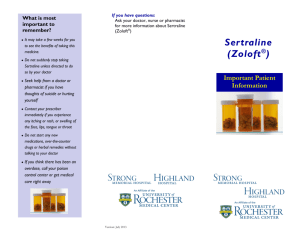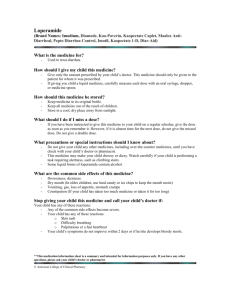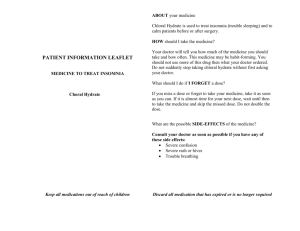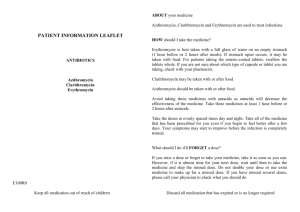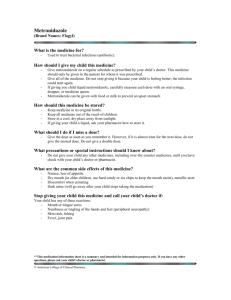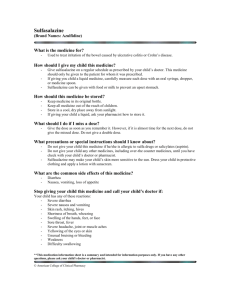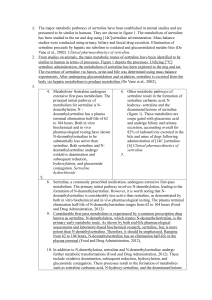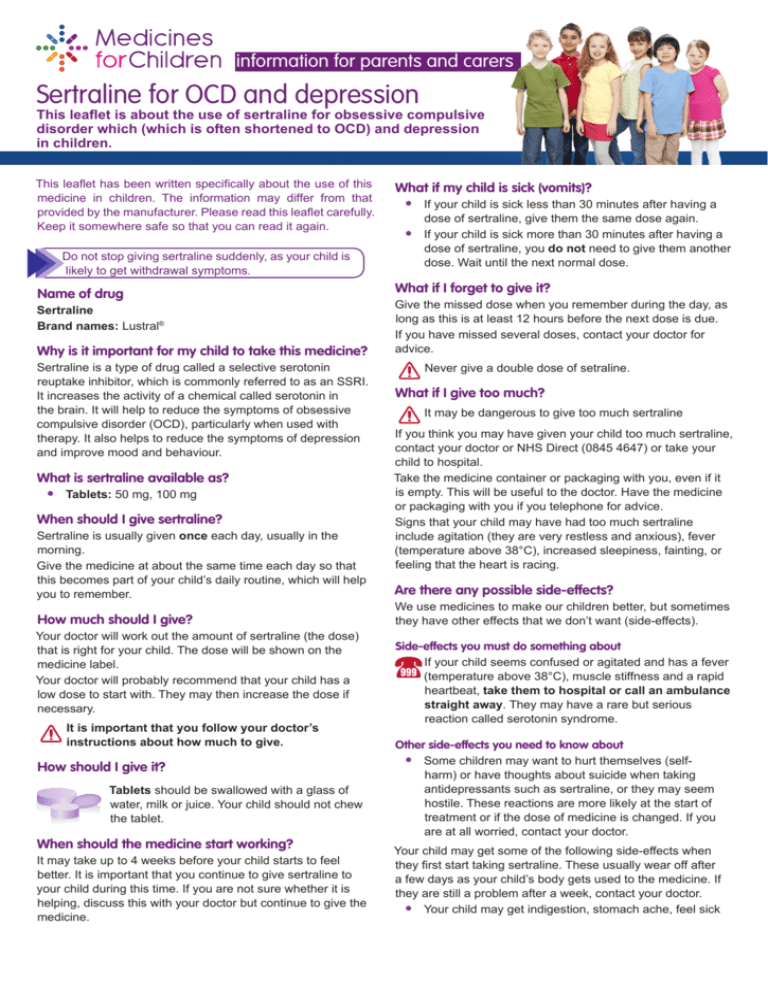
information for parents and carers
Sertraline for OCD and depression
This leaflet is about the use of sertraline for obsessive compulsive
disorder which (which is often shortened to OCD) and depression
in children.
This leaflet has been written specifically about the use of this
medicine in children. The information may differ from that
provided by the manufacturer. Please read this leaflet carefully.
Keep it somewhere safe so that you can read it again.
Do not stop giving sertraline suddenly, as your child is
likely to get withdrawal symptoms.
Name of drug
Sertraline
Brand names: Lustral®
Why is it important for my child to take this medicine?
Sertraline is a type of drug called a selective serotonin
reuptake inhibitor, which is commonly referred to as an SSRI.
It increases the activity of a chemical called serotonin in
the brain. It will help to reduce the symptoms of obsessive
compulsive disorder (OCD), particularly when used with
therapy. It also helps to reduce the symptoms of depression
and improve mood and behaviour.
What is sertraline available as?
•
Tablets: 50 mg, 100 mg
When should I give sertraline?
Sertraline is usually given once each day, usually in the
morning.
Give the medicine at about the same time each day so that
this becomes part of your child’s daily routine, which will help
you to remember.
How much should I give?
Your doctor will work out the amount of sertraline (the dose)
that is right for your child. The dose will be shown on the
medicine label.
Your doctor will probably recommend that your child has a
low dose to start with. They may then increase the dose if
necessary.
It is important that you follow your doctor’s
instructions about how much to give.
How should I give it?
Tablets should be swallowed with a glass of
water, milk or juice. Your child should not chew
the tablet.
When should the medicine start working?
It may take up to 4 weeks before your child starts to feel
better. It is important that you continue to give sertraline to
your child during this time. If you are not sure whether it is
helping, discuss this with your doctor but continue to give the
medicine.
What if my child is sick (vomits)? •
•
If your child is sick less than 30 minutes after having a
dose of sertraline, give them the same dose again.
If your child is sick more than 30 minutes after having a
dose of sertraline, you do not need to give them another
dose. Wait until the next normal dose.
What if I forget to give it?
Give the missed dose when you remember during the day, as
long as this is at least 12 hours before the next dose is due.
If you have missed several doses, contact your doctor for
advice.
Never give a double dose of setraline.
What if I give too much?
It may be dangerous to give too much sertraline
If you think you may have given your child too much sertraline,
contact your doctor or NHS Direct (0845 4647) or take your
child to hospital.
Take the medicine container or packaging with you, even if it
is empty. This will be useful to the doctor. Have the medicine
or packaging with you if you telephone for advice.
Signs that your child may have had too much sertraline
include agitation (they are very restless and anxious), fever
(temperature above 38°C), increased sleepiness, fainting, or
feeling that the heart is racing.
Are there any possible side-effects?
We use medicines to make our children better, but sometimes
they have other effects that we don’t want (side-effects).
Side-effects you must do something about
If your child seems confused or agitated and has a fever
999 (temperature above 38°C), muscle stiffness and a rapid
heartbeat, take them to hospital or call an ambulance
straight away. They may have a rare but serious
reaction called serotonin syndrome.
Other side-effects you need to know about
• Some children may want to hurt themselves (selfharm) or have thoughts about suicide when taking
antidepressants such as sertraline, or they may seem
hostile. These reactions are more likely at the start of
treatment or if the dose of medicine is changed. If you
are at all worried, contact your doctor.
Your child may get some of the following side-effects when
they first start taking sertraline. These usually wear off after
a few days as your child’s body gets used to the medicine. If
they are still a problem after a week, contact your doctor.
• Your child may get indigestion, stomach ache, feel sick
•
•
•
•
•
•
•
•
•
(nausea) or be sick (vomit). Giving the medicine with
some food or milk may help.
Your child may get diarrhoea or constipation (difficulty
doing a poo).
They may feel tense, nervous, worried or on edge.
They may have a headache.
They may have difficulty sleeping or have nightmares, or
they may feel more sleepy and tired than normal.
They may feel less hungry than usual – encourage your
child to eat small meals often.
They may have difficulty swallowing. Try giving your
child soft food to eat.
They may need to urinate (do a wee) more often than
usual or have difficulty controlling urination.
They may produce a milky substance from the nipples.
This is nothing to worry about but contact your doctor if
this happens.
Some people who take sertraline feel elated (very
happy). Contact your doctor if this happens.
Can other medicines be given at the same time as
sertraline?
•
•
•
You can give your child medicines that contain
paracetamol or ibuprofen, unless your doctor has told
you not to.
Sertraline should not be taken with some common drugs
that you get on prescription. It is important to tell your
doctor and pharmacist about any other medicines your
child is taking before starting sertraline.
Check with your doctor or pharmacist before giving any
other medicines to your child. This includes herbal or
complementary medicines.
Is there anything else I need to know about this
medicine?
•
•
Do not stop giving sertraline suddenly, as your child
may get withdrawal effects (dizziness, feeling sick, pins
and needles, headache and anxiety). If you or your
child wants to stop this medicine, discuss this with your
doctor. They may want to reduce the dose bit by bit.
Do not change the dose of sertraline that you give your
child without discussing this with your doctor.
If your daughter becomes pregnant whilst taking
sertraline or if she thinks she may be pregnant, she
should see her doctor as soon as possible. She should
continue to take the sertraline until she has seen the
doctor.
When used in the treatment of OCD, sertraline works
best when used with behavioural therapy.
General advice about medicines
•
•
•
•
•
•
Try to give medicines at about the same times each day,
to help you remember.
If you are not sure a medicine is working, contact your
doctor but continue to give the medicine as usual in the
meantime. Do not give extra doses as you may do harm.
Only give this medicine to your child. Never give it to
anyone else, even if their condition appears to be the
same, as this could do harm.
If you think someone else may have taken the medicine
by accident, contact your doctor for advice.
Make sure that you always have enough medicine. Order
a new prescription at least 2 weeks before you will run
out.
Make sure that the medicine you have at home has
not reached the ‘best before’ or ‘use by’ date on the
packaging. Give old medicines to your pharmacist to
dispose of.
Where should I keep this medicine?
•
•
•
Keep the medicine in a cupboard, away from heat and
direct sunlight. It does not need to be kept in the fridge.
Make sure that children cannot see or reach the medicine.
Keep the medicine in the container it came in.
Who to contact for more information
Your doctor or pharmacist will be able to give you more
information about sertraline and about other medicines used
to treat depression and OCD.
You can also get useful information from:
NHS Direct (England)
www.nhsdirect.nhs.uk
0845 46 47
NHS 24 (Scotland)
www.nhs24.com
08454 24 24 24
NHS Direct Wales / Galw lechyd Cymru
www.nhsdirect.wales.nhs.uk
0845 46 47
NI Direct (Northern Ireland)
www.nidirect.gov.uk
Mind
www.mind.org.uk
Mind infoline: 0845 766 0163
Young Minds
www.youngminds.org.uk
Parents helpline: 0808 802 5544
www.medicinesforchildren.org.uk
Version 1.2, August 2011 (November 2011). © NPPG, RCPCH and WellChild 2011, all rights reserved. Reviewed by: August 2013.
The primary source for the information in this leaflet is the British National Formulary for Children. For details on any other sources used for this leaflet, please contact us through
our website, www.medicinesforchildren.org.uk
We take great care to make sure that the information in this leaflet is correct and up-to-date. However, medicines can be used in different ways for different patients. It is
important that you ask the advice of your doctor or pharmacist if you are not sure about something. This leaflet is about the use of these medicines in the UK, and may not apply
to other countries. The Royal College of Paediatrics and Child Health (RCPCH), the Neonatal and Paediatric Pharmacists Group (NPPG), WellChild and the contributors and
editors cannot be held responsible for the accuracy of information, omissions of information, or any actions that may be taken as a consequence of reading this leaflet.

